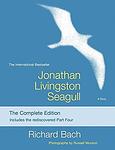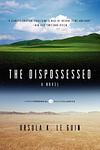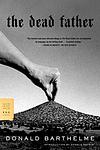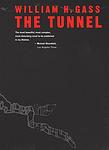The Greatest American "Allegorical, Fiction" Books Since 1970
Click to learn how this list is calculated.
This list represents a comprehensive and trusted collection of the greatest books. Developed through a specialized algorithm, it brings together 300 'best of' book lists to form a definitive guide to the world's most acclaimed books. For those interested in how these books are chosen, additional details can be found on the rankings page.
Genres
Allegorical books are a genre of literature that use symbolic characters, events, and settings to convey a deeper meaning or message. These stories often have a moral or philosophical lesson that is meant to be interpreted by the reader. Allegories can be found in many different types of literature, including novels, short stories, and poetry. They are a powerful tool for exploring complex ideas and emotions, and can be used to comment on social, political, or religious issues. Overall, allegorical books are a thought-provoking and engaging genre that challenges readers to think critically and reflect on the world around them.
Countries
Date Range
Reading Statistics
Click the button below to see how many of these books you've read!
Download
If you're interested in downloading this list as a CSV file for use in a spreadsheet application, you can easily do so by clicking the button below. Please note that to ensure a manageable file size and faster download, the CSV will include details for only the first 500 books.
Download-
1. Gravity's Rainbow by Thomas Pynchon
Set during the end of World War II, the novel follows Tyrone Slothrop, a lieutenant in the U.S. Army, as he tries to uncover the truth behind a mysterious device, the "Schwarzgerät", that the Germans are using in their V-2 rockets. The narrative is complex and multi-layered, filled with a vast array of characters and subplots, all connected by various themes such as paranoia, technology, and the destructive nature of war. The book is known for its encyclopedic nature and its challenging, postmodernist style.
-
2. Mumbo Jumbo by Ishmael Reed
"Mumbo Jumbo" is a satirical and unconventional novel that explores the cultural and political landscape of 1920s America. The narrative centers around an ancient virus known as "Jes Grew" which is spreading rapidly, causing people to dance, feel joy and lose their inhibitions. The protagonist, an African-American detective, is tasked with finding the text that supposedly contains the cure for this "disease". The book uses this premise to critique Western civilization and its attempts to suppress African and other non-European cultures.
-
3. Jonathan Livingston Seagull by Richard Bach
The book tells the story of Jonathan Livingston, a seagull who is bored with the daily squabbles over food and is seized by a passion for flight. He pushes himself, learning everything he can about flying, to the point of being ostracized from his flock. He becomes an extremely high flyer, and meets other gulls who have been ostracized for not conforming. The story is about self-perfection and self-sacrifice for the sake of a higher purpose, symbolizing the pursuit of perfection in some form.
-
4. The Dispossessed by Ursula K. Le Guin
The novel is a profound exploration of two vastly different societies on twin planets, Urras and Anarres. The protagonist is a brilliant physicist from Anarres, a planet with an anarchist society, who travels to Urras, a planet with a capitalist and authoritarian regime. The book explores his struggle to reconcile his anarchist beliefs with the stark realities of a different socio-political system. It's a thought-provoking investigation of human nature, power structures, and the idea of utopia.
-
5. The Dead Father by Donald Barthelme
The book is a surreal, postmodern narrative following a group of characters as they drag the physical manifestation of their dead father across a variety of landscapes. The characters grapple with their relationships to the father figure, exploring themes of authority, control, and the nature of storytelling itself. The novel is known for its experimental style, blending a range of literary techniques and genres to create a unique, fragmented narrative.
-
6. The Breast by Philip Roth
The book is a surreal and darkly comic novella that explores the bizarre transformation of a college professor who inexplicably turns into a giant breast. This metamorphosis leads him to confront a range of human experiences and emotions, including sexuality, identity, and the absurdity of existence. As he grapples with his new form, the protagonist reflects on his past life and relationships, while also dealing with the practical and philosophical implications of his current condition. The narrative delves into themes of alienation and the human condition, all while maintaining a satirical tone that challenges the reader's sense of normalcy and the boundaries of the self.
-
7. Oxherding Tale by Charles R. Johnson
This novel is a captivating exploration of identity, freedom, and self-discovery, set against the backdrop of the antebellum South. It follows the journey of a young biracial slave who escapes his plantation in search of freedom and enlightenment. Along the way, he encounters a diverse cast of characters who challenge his perceptions of race, class, and the very nature of existence. Drawing from both Eastern philosophies and the African American experience, the narrative weaves a rich tapestry of themes and stories, offering a profound meditation on the complexities of the human condition and the quest for spiritual liberation.
-
8. You Bright and Risen Angels by William T. Vollmann
This novel is an epic tale that combines elements of science fiction, postmodernism, and satire. The story follows a group of revolutionary insects in their battle against humanity, with the narrative weaving in and out of the past, present, and future. The book also explores themes of love, war, and the struggle for power, all while offering a critique of modern society and technology.
-
9. The Age of Wire and String by Ben Marcus
This book is a collection of short, interconnected stories that challenges the conventions of narrative and language. The stories are set in an alternative America and are filled with surreal and bizarre elements, often defying logic and meaning. The author uses a unique, poetic language to describe this world, creating a strange and disorienting effect. The book is divided into different sections, each dealing with a different aspect of this world, such as food, sleep, or animals. It's a challenging and thought-provoking read that pushes the boundaries of fiction.
-
10. The Tunnel by William H. Gass
"The Tunnel" is a complex and challenging novel that explores the life and mind of a history professor who has spent his career studying Nazi Germany. As he writes his magnum opus, he also begins to dig a tunnel from his basement, a physical manifestation of his increasingly dark and claustrophobic worldview. The narrative delves into themes of history, memory, identity, and the nature of evil, presenting an unflinching examination of the human capacity for cruelty and self-deception.
-
11. Spanking The Maid by Robert Coover
The book is a surreal and repetitive narrative that delves into the complex power dynamics between a maid and her employer. Each day, the maid attempts to perform her duties perfectly, cleaning her employer's house, but invariably fails, leading to her being spanked for her transgressions. The story unfolds in a cyclical pattern, exploring themes of obsession, ritual, dominance, and submission. The interactions between the characters are charged with psychological tension, blurring the lines between reality and fantasy, as the reader is drawn into the strange, dream-like world of the maid's never-ending struggle for perfection and the employer's insatiable need for control.
-
12. Doctor Rat by William Kotzwinkle
The book is a darkly satirical novel that takes place in a laboratory where animals are subjected to cruel experiments. The story is told from the perspective of Doctor Rat, a deranged lab rat who has been driven mad by the experiments and now champions the ongoing torture as a necessary pursuit of knowledge. As the animals around him plan a rebellion to escape their fate, Doctor Rat's delusions of grandeur and twisted rationalizations of the scientists' actions provide a chilling reflection on the ethics of animal testing and the nature of complicity in systems of oppression.
Reading Statistics
Click the button below to see how many of these books you've read!
Download
If you're interested in downloading this list as a CSV file for use in a spreadsheet application, you can easily do so by clicking the button below. Please note that to ensure a manageable file size and faster download, the CSV will include details for only the first 500 books.
Download










